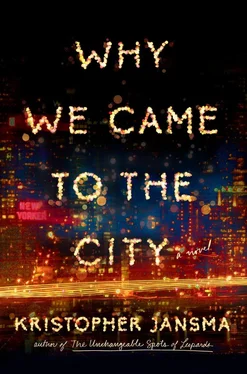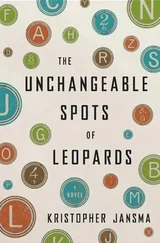“Sorry. I had to change in a Starbucks bathroom that smelled like dead aardvarks and—”
Sara interrupted. “Oh, speaking of — this is for you.” She dug an oil-stained brown bag from her bottomless purse.
Irene peeled back the paper to reveal a single, smushed vanilla cupcake. Little rainbow sprinkles formed a lopsided swirl, winking up like stars.
“They made us buy something. Can you believe it?”
In fact, Irene could not believe it. First, Sara was a rotten liar, and second, everyone knew Starbucks was one place you could use the bathroom without paying for something; it might as well be rule two of city living.
George winked at Irene as she helped slip off Sara’s coat. “Someone was afraid you didn’t eat today,” he murmured.
Sara pretended to object, but Irene kissed her cheek again. “Well, did you?” Sara inquired, and before an answer was given, she reached up to poke the faint spot beneath Irene’s eye.
Irene snapped her head to one side. “I had some grapes.”
She already regretted telling Sara about last week’s CT scan, which meant she’d just keep worrying and eventually she’d ask about yesterday’s follow-up appointment.
“Jacob here yet?” George asked, absently trying to take Sara’s coat so he could hang it.
Irene yanked it back. “Not yet. But he’s always late.”
“But we’re late.”
“He’s always later.”
Then, as Irene moved to close the door, she saw someone approaching — a young Korean man who was shyly inspecting the wall. It took two seconds to see that he didn’t belong there. Distantly, she remembered him from somewhere. He wore a sharp, gray Armani suit and held, in one hand, a bottle of Bollinger Blanc. Who brings champagne to a catered party? Irene wondered as she tried to remember which gallery he worked for. She wasn’t entirely surprised to see Sara give the boy a bear hug.
“William Cho ? What are you doing here? Irene, did you know William? He was in Art History II with McClellan. You sat in on that one.”
Irene didn’t hesitate to grip his wet, gloved hand in welcome. He was very thin, with cheekbones that she was sure she’d have remembered if he’d had them back in college. People don’t just go around getting cheekbones , she told herself. Or coal-black eyes like that either. She liked the girlish line of his upper lip; he bit it nervously whenever he looked at her. Normally she wasn’t very interested in shyness, but something about him was making her blush.
Sara turned. “George, you remember William.”
They shook hands politely. “Sure! William Cho, right? We met at that newspaper party with Lisa Schmidt. Sara took over as features editor after Lisa went to Madagascar with that guy with the Rhodes… honey, what was his name?”
Sara knew it (Henry Fordham, Jr.), and also that the girl’s name had been Lisa Schlick, but from the look on William’s face, Irene guessed he didn’t know either of them.
“Hang on!” George said, “Before we get caught up, let me grab us all something from the bar.”
It was understood that Irene had to wait until the guests had finished arriving, but Sara said anything involving St. Germain would be terrific. It was only then that William thrust forward the bottle of champagne that he’d been cradling like a football.
George seized it with grateful hands. “ Damn. This is nice stuff, William.”
“I stole it,” William abruptly announced.
“Like, you boosted it?” George asked. “Don’t tell me you boosted this.”
Sara laughed. “Boosted? What are you, a thirties gangster?”
George winked at her while William clarified. “Yeah. I mean — no. I didn’t rob a liquor store or anything. But it’s been under the coatrack in my boss’s office since last Christmas.”
Turning the bottle over, George peeled a shiny gift tag off the bottom. “‘To Lenny. From the Berg-Geldorf Family!’ Well thank you, Berg-Geldorfs! I’ll see if the guy can put this on ice.”
He clapped William on the back. Then, while Irene and Sara turned their attention to William, he slipped into the main room with every appearance of happiness.
Truth be told, however, George was feeling unusually nervous. His mind was elsewhere. Ordinarily the gallery Christmas party was his best excuse all year to get all dressed up and feel metropolitan, but this time he was in no mood. He looked around, smiling at everyone and no one in particular, as a sensation crept up his spine that somehow they could tell that he was from the Midwest, that these artists could see the sleepy cornfields in his complexion. Not like he’d grown up on a farm . Fairfield Beach was ten miles from Columbus. His parents had belonged to the yacht club. But tonight he wasn’t feeling very yachty. He was counting on a few drinks to settle his nerves. The accident had been over on the eastbound side, but everyone on his side had been rubbernecking like their lives depended on it. Like they’d never seen a crash before. Oooo look at the flashing lights! How exciting!
He looked up to realize that the bartender was eyeing him. “Do you have a bucket of ice we could chill this in?”
The graying-haired man frowned. “This isn’t a nightclub. I don’t do bottle service.”
Poor guy looked exhausted. George smiled and took a twenty out of his wallet — the only thing in there — and slipped it into the tip jar. This both worked and didn’t. The bartender took the bottle and plunked it into an empty punch bowl that he angrily began to shovel ice into, resentful at the implication that he could be bought, even if he could be.
George fidgeted with the button on his new jacket. Open, the fabric whooshed backward like a cape when he walked too quickly. Closed, it made him look uptight, almost as bad as that William guy. George couldn’t remember having seen him in college, not once. He was quiet, polite, and finely dressed, which meant that Jacob was going to hate him. Just knowing how much Jacob would hate him was making George sweat. Where was Jacob anyway? How was he always, always later than the rest of them? How did he know? Why wouldn’t he just show up , so he could be mean to William and the girls could get upset and George could swoop in to set things right and they could all go home?
When the bartender had finished sourly shoveling the ice, George ordered something off the ornately printed menu called a Death in the Desert. It tasted sickeningly of licorice. He thought about asking for something else — open bar and all — but didn’t want to show weakness. He gulped the drink down and pretended to be deep in appreciation of a nearby painting of a man eating his own bowels. If there was one real artist there, it was Irene. Over the years he’d seen the most outrageous, beautiful things come off her fingertips. She had a sort of effortless, infinite control over the thickness of a line, or the shade of oils, and the proportion of lightness to shadow. Walking through the city’s museums, George was often sure that he’d just seen one of her paintings out of the corner of his eye.
“ Wan’nother? ” the bartender grumbled.
“Death in the Desert,” George said. “That’s a pretty hard-boiled name.”
“Iss’a poem. All the drinks got names of poems.” He tapped the company logo on the napkins: Dead Poets Society Functions.
“Cute,” George said. “So no living poets? Couldn’t get a Billy Collins in a tall glass?”
“The Wasteland is pretty good,” the bartender offered. “Got tea-infused bourbon in it.”
George was soon handed a cloudy gray drink that tasted like neither tea nor bourbon. In fact it tasted like nothing at all, which was fine by him, so long as it made the party a little blurrier. Then he got Sara a Faerie Queen, involving St. Germain and blueberries, and resumed scanning the room. Finally he put his finger on it. Last year more people had been dressed up. A lot more. In fact he couldn’t see anyone else wearing a suit, except for William. Had suits suddenly gone out of style? There were an awful lot of piratical mustaches going on around him. Two — no, three different guys with muttonchops. What was the point of looking different in exactly the same way as everybody else? No wonder all their dumb art was so dumb — edgy but harmless. Pairs of safety scissors in gilded frames.
Читать дальше












